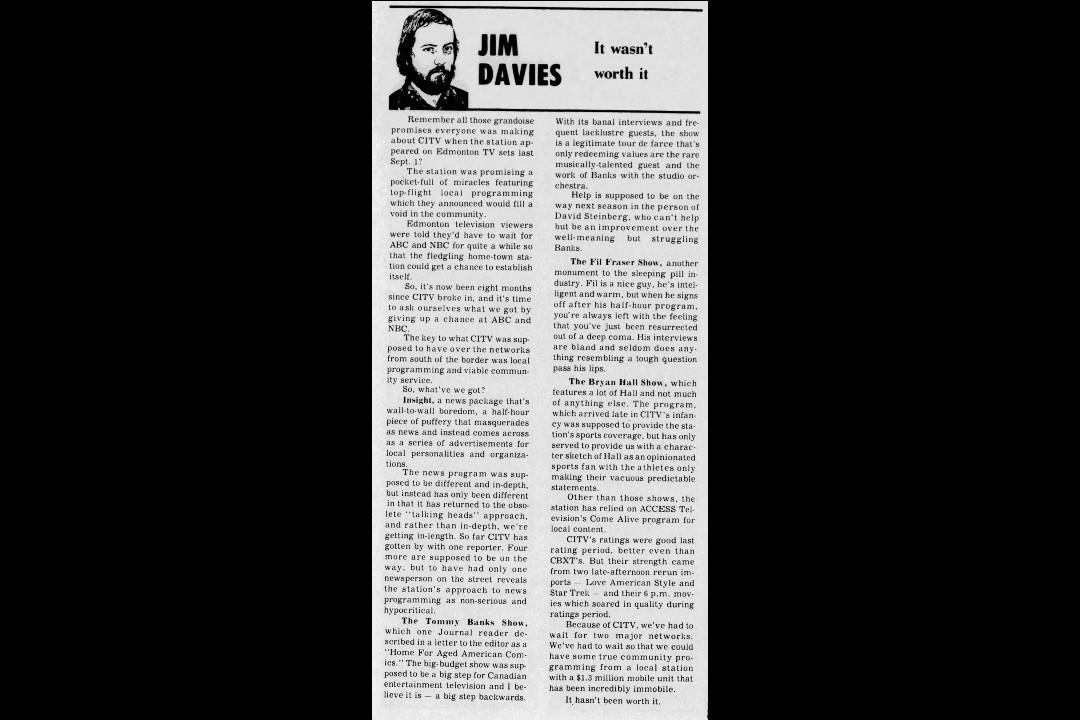On this day in 1975, one of Edmonton's most storied TV stations was off to a rocky start.
When Edmonton surgeon and businessman Charles Allard opened his TV station, it was after nearly 15 years of effort. Allard, who already owned a local radio station, first applied to open what would have been the city's second TV station in 1960. His bid was unsuccessful, with the licence instead going to CBC.
Eventually, Allard got his TV licence, beating two other applicants largely on a promise that the new station would carry a significant amount of local programming. On Sept. 1, 1974, Edmonton's Independent Television hit the airwaves under the callsign CITV, though most just called it ITV.
It wasn't a smooth start. The station's first broadcast ran into technical problems, with some pieces running without audio or video. Those problems were quickly fixed, but criticism of the station's programming continued. The scathing 1975 newspaper review of ITV's programming pictured above took aim at the station, dismissing its content as "wall-to-wall boredom," and "a monument to the sleeping pill industry" (although the writer seemed most angry that ITV's mere existence delayed the introduction of larger American networks to the Edmonton TV scene).
The Canadian Radio-television and Telecommunications Commission also wasn't a huge fan of ITV in its early years. In 1978, the CRTC renewed the station's licence for only 18 months, warning that it hadn't fulfilled its local programming promises, and its future was in doubt.
But ITV hung on. The next few years saw ratings increase, along with stronger revenues and attention for its local programming. The station slowly became an anchor of Edmonton's media landscape. In addition to a popular nightly newscast, ITV put forward a strong slate of local programming, including shows hosted by Edmonton music legend Tommy Banks, a successful televised concert series, and a couple of current affairs shows hosted by the celebrated Fil Fraser, Canada's first Black broadcaster. In 1979, when the Edmonton Oilers joined the NHL, ITV was the station that fans would turn on to watch the game.
Of course, ITV is probably best known for being the home of SCTV, the much-beloved comedy show that has influenced generations of comedians.
In 1981, ITV became a superstation and was broadcast nationwide on cable TV, reaching audiences far beyond what the limits of its Edmonton transmitter. In the '90s, Allard's company sold ITV to a media company, which continued to run the station under the ITV name. Then, in 2000, the station was sold again, this time to media conglomerate Canwest. This meant the station was no longer independent, and it was folded into the company's Global TV Network. Still, while the owner and station name changed, many of the local shows and personalities remained through the transition.
Last summer, the station celebrated its 50th anniversary. The TV business has changed dramatically in the half-century since the scrappy ITV aired its first broadcast, with shrinking budgets, increased consolidation, and less local programming becoming the reality for broadcasters across Canada. However, there have been some recent moves to increase the amount of made-in-Alberta film and TV. A couple of weeks ago, for example, the province announced millions in funding for creative productions in Alberta.
This clipping was found on Vintage Edmonton, a daily look at Edmonton's history from armchair archivist Rev Recluse of Vintage Edmonton.

